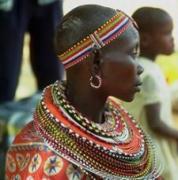
Kenya (MNN) — Their mission is to "train African missionaries who will go out, cross-culturally to unreached groups," said Jill Davis.
Ray and Jill Davis have worked for 10 years in Eldoret, Kenya with the Mission College of Africa Inland Mission. Their students are already pastors who are often married and sometimes
have families. "We require that they come with their wives and their children, if they have children, and we train the whole family to be missionaries," said Jill.
She says the plan to help Africans reach out in their own nations is to help them strategically fulfill the Great Commission — to reach groups that non-native missionaries could not easily reach. "Even though they are different in their culture, their cultures are closer to those cultures because they're Africans," she said.
They also watched as the violence erupted after the presidential elections. The economic
difficulty that resulted will likely affect churches who usually support the sending of missionaries. In addition, the tribal grievances are another challenge for Christians to overcome. But "this has forced Christians to look at themselves, to examine themselves, and I think that's a positive thing" Ray explained.
Ray said he has seen Christian members of the two opposing tribes reach out to protect each other, but he's also seen neighbors betray neighbors. "It's a risk for them because sometimes if you go against your own people, your own people can put you in danger." This creates danger of the church backsliding since Christians may be more hesitant to reach out.
Despite that fear, they believe that Christians are part of the solution along with the government officials doing their part. "We believe a grassroots movement of believers in local churches, local neighborhoods and communities should be reaching out to one another," Ray said.
At the college, the Davis's work helps students to bridge cultural gaps and create understanding which could be a vital tool even in their own villages between opposing tribes. Students learn to survive in a culture with different customs,
hospitality, greetings, etc. "These particular differences might not have anything to do with their getting saved, so our students need to learn how to go into another culture and make friends with people so they can bring them to Christ," said Jill.
She also explained that once their students complete the training, many are going to strategic places that they otherwise would never have dreamed of going. "We even have missionaries going to places that we couldn't mention on the radio because they are closed places. And yet, as Kenyans, they are able to go to those places and reach out to people with the
Gospel, so it's exciting."
Since the distrust lies mainly between tribal members, the risk for ex-patriots is minimal. Ray said the situation is generally calm right now, and the only danger might be circumstantial–for example, if a riot were to break out where an ex-patriot was visiting.
Ray said prayer is vital. Pray that the church will be refined and matured through this situation and that they would rise up to be an influence on society. Many Kenyans claim to be Christians. If all of them lived out the Christian life Biblically and obediently, Ray said they could make a real difference in society.
Finances are also needed for IDPs who struggle to get food and firewood to even cook their food. Children in the camps are not in school, and the young people often tend toward crime.
According to Ray, other nations were shocked by the once-stable Kenya's chaotic situation. However, he believes that through prayer, Kenya can rise up once again to take the baton to be a powerful force for the Gospel in Africa.
